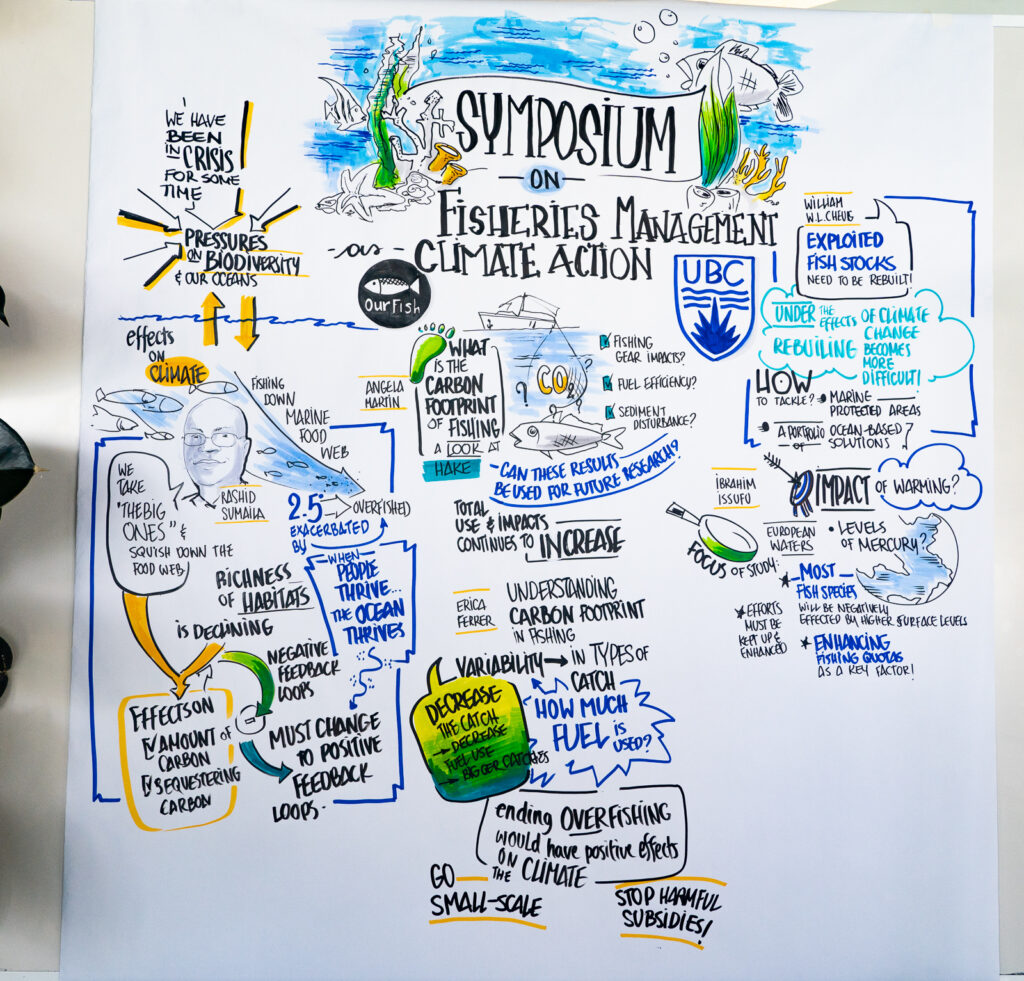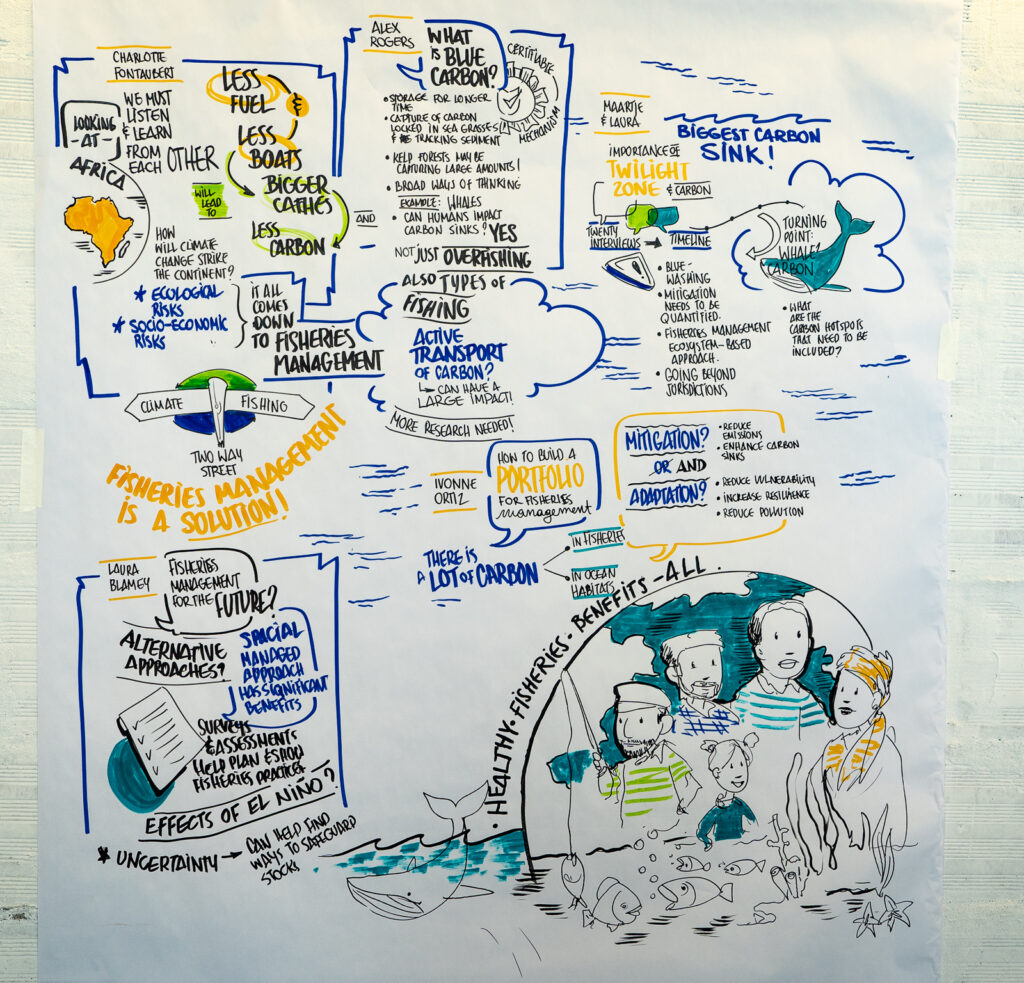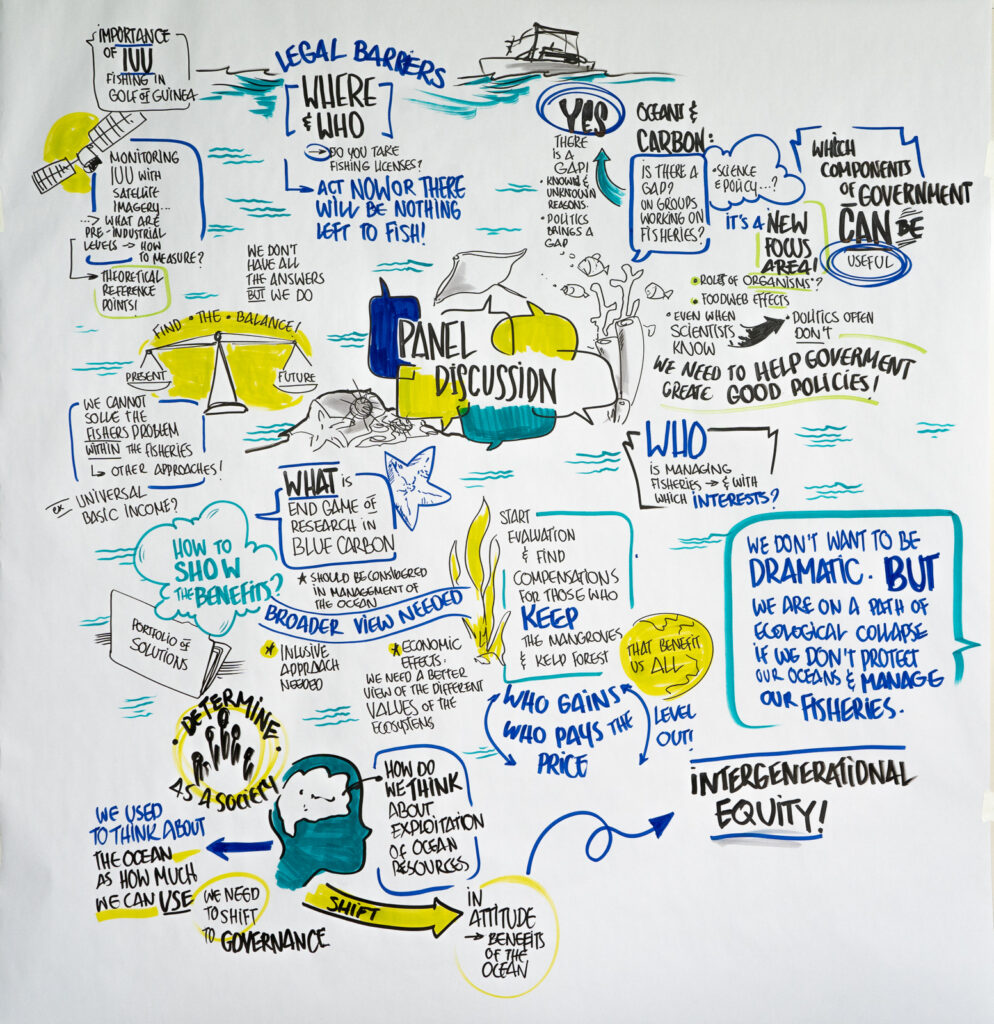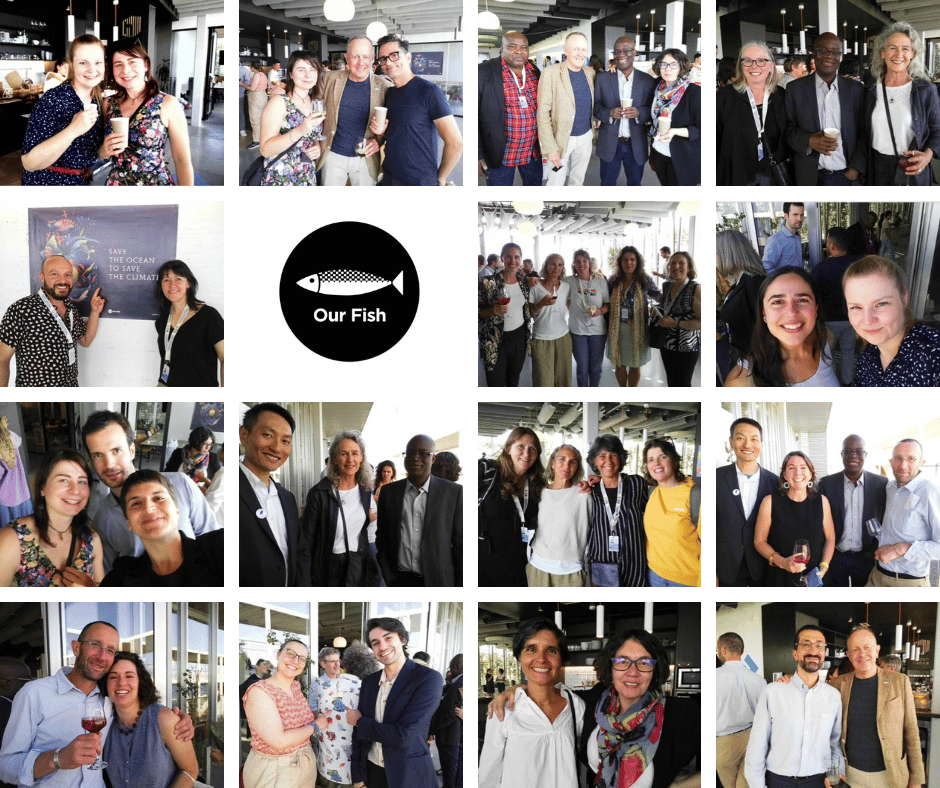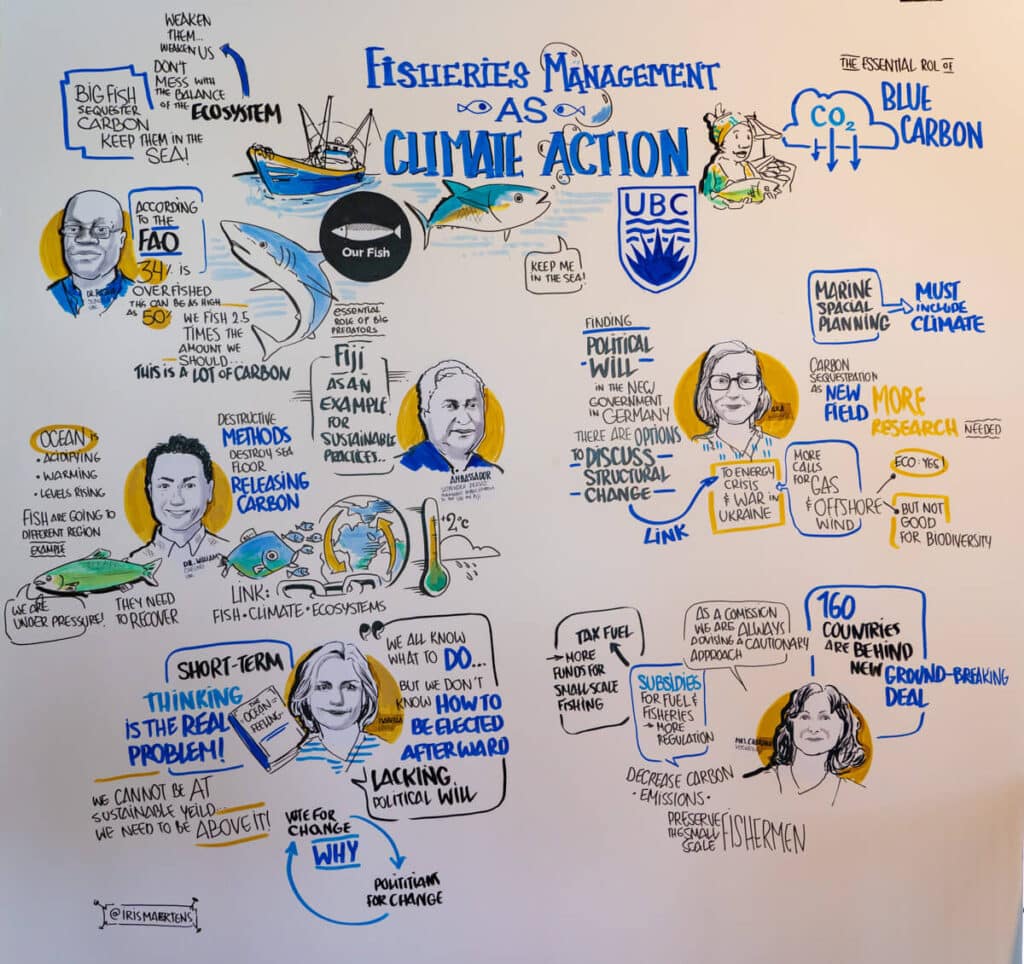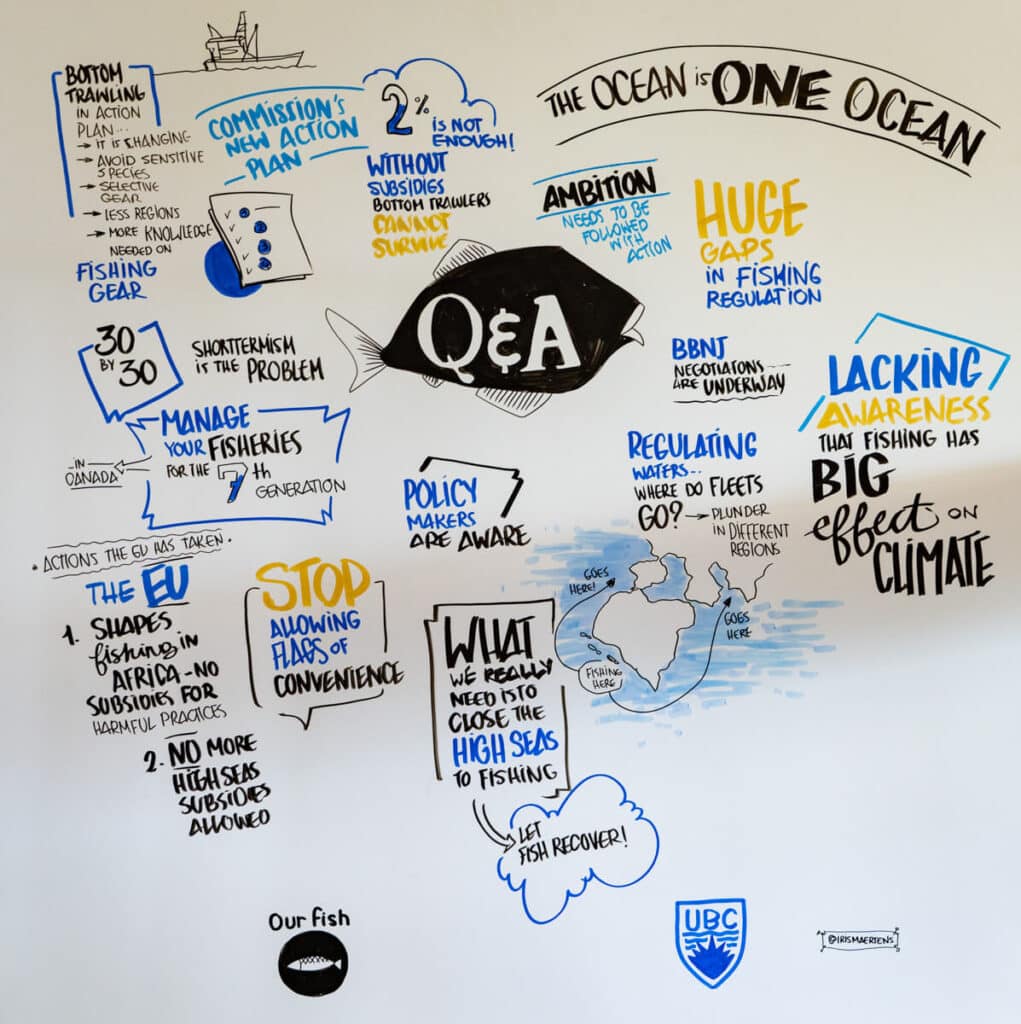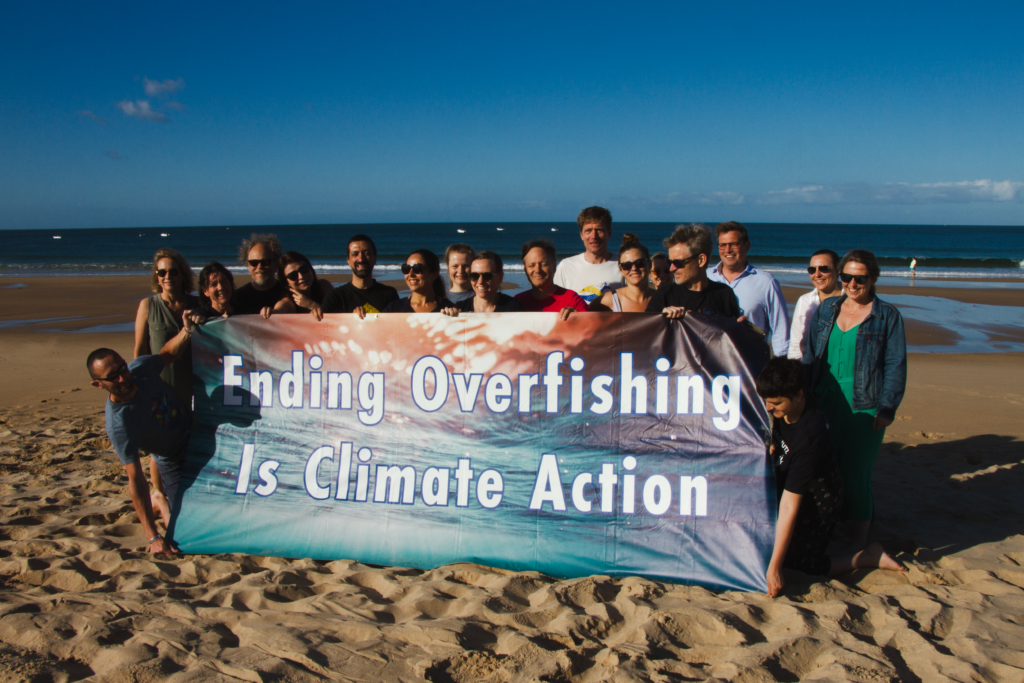
Ending Overfishing is Climate Action – morning swim at Estoril, Lisbon. Photo: Dona Edite
The Our Fish team recently returned from Lisbon, Portugal, where we – along with our friends and allies – delivered a message to global leaders during the UN Ocean Conference: that by ending destructive fishing, they would be taking straightforward, positive action to bolster marine life’s ability to withstand climate heating and improve carbon sequestration – and that this would make a huge difference in the fight to tackle ecological collapse!
We shared this message during several official side events that took place with the support of our partner organisations – a science symposium, a reception for schmoozing, a hearty dip in the Atlantic Ocean – all of which took place before the main conference even opened. These were followed by a mid-week packed-to-the-rafters breakfast briefing featuring prominent scientists and EU policymakers, before we took our “Ending Overfishing is Climate Action” banner to the Blue Climate March, joining hundreds of other people calling on their governments to wake up and protect the ocean. Read on to learn more.
Event #1: Science Symposium: Fisheries Management as Climate Action
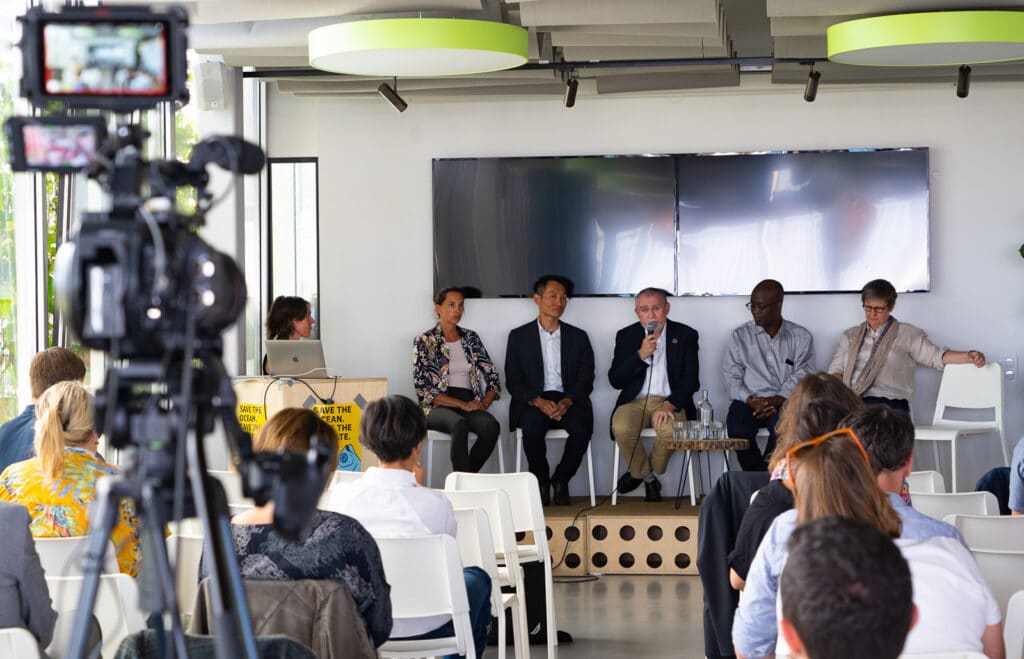
L-R: Rebecca Hubbard, Program Director Our Fish; Dr Laura G Elsler, Co-lead DEI, Early Career Ocean Professionals Program; Dr William Cheung, IPCC Lead Author and Professor and Director, Institute for the Oceans and Fisheries, The University of British Columbia; Prof. Alex Rogers, Director of Science at REV Ocean; Dr Rashid Sumaila, Professor and Director of the Fisheries Economics Research Unit, Institute for the Oceans and Fisheries, The University of British Columbia; Charlotte de Fontaubert, Global Lead for the Blue Economy at The World Bank. Photo: Dave Walsh/Our Fish
As UN Ocean Conference delegates poured into Lisbon, leading fisheries and marine scientists and economists from around the world headlined the Science Symposium, which provided a deep dive into the connection between fisheries management and action on the climate and biodiversity emergency.
The speakers presented from a series of papers, recently published in the research topic “How Overfishing Handicaps Resilience of Marine Resources Under Climate Change” in Frontiers in Marine Science, to illustrate how fisheries management measures can positively affect climate adaptation and mitigation, contribute to the restoration of ocean health, improve returns for fishers, and increase resilience to the climate impacts on fisheries that are already underway.
Speakers: Dr Rashid Sumaila, Dr Charlotte Fontaubert, Dr William Cheung, Dr Laura Blamey, Dr Alex Rogers, Erica Ferrer, Dr Sebastian Villasante, Dr Laura G Elsler and Dr Maartje Oostdijk, Ibrahim Issifu, and Ivonne Ortiz
What the speakers said:
“The value of blue carbon should be considered in terms of management of the ocean. Traditionally fisheries management hasn’t considered these ecosystem impacts of fishing. Fisheries management bodies don’t have enough experience or capacity onboard, so they need to acquire that capacity to think about fish in the broader ecosystem and climate context” – Dr Alex Rogers, Director of Science at REV Ocean
“We need to think about how to balance the future and now – we cannot solve the fisheries problem within the fisheries sector” – Dr Rashid Sumaila, Professor and Director of the Fisheries Economics Research Unit, Institute for the Oceans and Fisheries, The University of British Columbia
“We need to do a cost-benefit analysis – value the ecosystem so that those who pay the short-term cost of conservation (such as protecting mangroves or stopping fishing) can be compensated for others to gain the global benefits” – Charlotte de Fontaubert, Global Lead for the Blue Economy at The World Bank
Key Takeaways from the Symposium:
- Overfishing truncates the food web and weakens the system, making it more vulnerable to shocks like climate change. Fish are like people in this way – just as a healthy person is more likely to survive COVID, fish populations are more likely to survive climate impacts if they are healthy
- The biomass of sensitive fish stocks will be significantly lower under climate change so specific conservation focused rebuilding plans are needed to ensure the fish stocks will be climate-adaptive.
- Studies have found that by reducing overcapacity, we can catch more fish: this means less boats, burning less fuel, contributing less to greenhouse gas emissions, and catching more fish
- ‘Business as usual’ fisheries management may increase risk to stocks under future climate uncertainty, so accounting for this uncertainty and greater precaution can help safeguard stocks in a changing climate
- Oceanic blue carbon has enormous potential and is clearly impacted by human activities – it’s not just overfishing impacts that are a problem, but the types of fishing that we are doing, such as bottom trawling, that are a very important consideration
- The ocean carbon cycle is a network where carbon is the currency; the more connections there are and the stronger they are, the more possibility for adaptation, and more opportunities for commercial activities
- Mitigation aims to reduce emissions (eg. reduce overcapacity) and enhance carbon sinks (eg. reduce overfishing and discards, sediment disturbance), while adaptation focuses on reducing vulnerabilities, increasing resilience (eg. protect habitats, incorporate climate info into stock assessments), and reducing pollution (because the effects of pollution are amplified by climate change).
- Incorporating and implementing both adaptation and mitigation as part of the established management process can be the basis of a framework to develop, maintain and grow a portfolio of climate actions over time.
- We need a portfolio of solutions that can complement one another that are well designed – there are safe bets, which the current institutions and mechanisms can deliver immediately, and have co-benefits etc, and then there are wild card solutions, which require systemic changes but can have much bigger impacts. We need them all.
Watch the video:
Check out the amazing live art created by Iris Maertens during the symposium:
Event #2: Cocktail Hour
The symposium was followed by a reception, where after years of restraint – and Zoom calls – fishy people could connect and reconnect on a sunny Lisbon afternoon with music and food. And we were on the loose with a camera to prove it!
This event was supported by: Deutsche Umwelthilfe, German Postcode Lottery, Our Fish, Sciaena, University of British Columbia Institute for the Oceans and Fisheries.
Event #3: Early Morning Swim -Dive into Fisheries Management

Photo: Dona Edite
Before the UN Ocean Conference had even opened, we announced a plan to wake ourselves up with a cold early morning splash in the Atlantic. Our Fish’s Mike Walker said,
“Before we save the ocean, we have to get in the ocean and celebrate it”
All life comes from the ocean and it is our number one ally in fighting climate change, so we decided to celebrate by bringing people together to reinforce our connection to the ocean – before we spend our week working to defend it!
You never regret a swim. Check out the video here:
Supported by: Cascais municipality, Deutsche Umwelthilfe, Deutsche Postcode Lotteries, Our Fish, Oceana, Sciaena, Seas At Risk, Sustainable Ocean Alliance, University of British Columbia Institute for the Oceans and Fisheries
Event #4: Breakfast Briefing – Fisheries Management as Climate Action
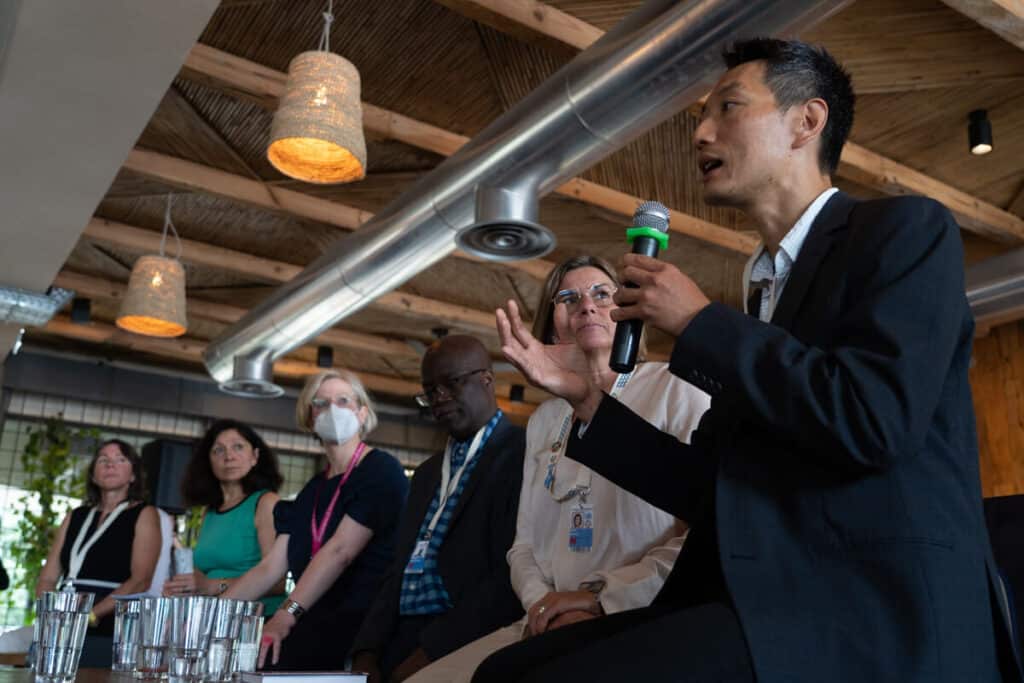
L-R – Our Fish’s Rebecca Hubbard, Charlina Vitcheva, Ilka Wagner, Rashid Sumaila, Isabella Lövin, William Cheung. Photo: Dave Walsh
Our final event played to a packed house – as Dr Rashid Sumaila and Dr William Cheung of the University of British Columbia were joined by Isabella Lövin, Former Deputy Prime Minister and former Environment Minister of Sweden, Charlina Vitcheva, Director-General, Maritime Affairs and Fisheries, European Commission and Ilka Wagner, Head of department, marine conservation, Germany’s Federal Ministry for the Environment, Nature Conservation, Nuclear Safety and Consumer Protection, for a discussion on how the science of fisheries management can support a political response to the climate and biodiversity crisis.
Our global experts provided the basics of the science, before the panel discussed the politics and opportunities for transforming fisheries management into a positive driver for mitigating climate change and restoring ocean health.
“We need all hands on deck to reduce greenhouse gas emissions, include the fishing sector, so we need to reduce overfishing, reduce the use of fuel, which will directly reduce emissions, and stop destructive fishing methods that affect important coastal ecosystems” – William Cheung, IPCC Lead Author and Professor and Director, Institute for the Oceans and Fisheries, The University of British Columbia
“There are short term economic interests that are destroying our ocean. That is a fact that we shouldn’t shy away from – we should look to politicians and call on them to take the right decisions so that we can be conscious consumers and save our world” – Isabella Lovin, Former Deputy Prime Minister and former Environment Minister of Sweden
“We have to find the right balance. We need to give perspective for fishermen and have a bold decision on the most harmful gears… We will come with a plan and concrete proposals by the end of this year.. for decarbonising the EU fishing fleet” – Charlina Vitcheva, Director-General, Maritime Affairs and Fisheries, European Commission
“Of course it’s not enough to have just the number of MPAs – over 45% of sea in Germany is in MPA but we have no real restrictions. What we would like to see from the government is to have an integration of designation of MPAs and climate change – it’s not enough to know climate change is an issue, we need to integrate it into the processes, and make MPAs climate proof” – Ilka Wagner, Head of department, marine conservation, Federal Ministry for the Environment, Nature Conservation, Nuclear Safety and Consumer Protection, Germany
“It’s really important to have the nexus between fisheries and climate. When we look at the CFP in the EU, climate change does not play a role at all and not on the ground when we look at fisheries management like having less dredging, less mobile contacting gears. The CFP is a traditional conservation policy, but we really need to take into account what climate change means for fisheries?” – Ilka Wagner, Head of department, marine conservation, Federal Ministry for the Environment, Nature Conservation, Nuclear Safety and Consumer Protection, Germany
Key Takeaways from the Breakfast Briefing:
- Ambition from key political players like the EU is important
- We are still caught in a paradigm of short-term economic gains – resulting in a gap between ambition and delivery
- Recent elections, such as in Germany, demonstrate that the public support wants bold, urgent action that meets the seriousness of the climate and biodiversity crisis
- “Indigenous people in Canada talk about managing resources for the 7th generation – if you do that, you can get infinite fish and they will give you benefits for infinity” – Rashid Sumaila
- The situation is becoming critical – ocean life, fish populations, fishing industry, climate change.
- The highest impacted and risk area for fisheries under climate change is West Africa, so we need to make sure that we are not shifting the demand of fish from the EU to West Africa, because they need the fish for biodiversity and local communities
- We have a clear opportunity to transform fisheries management into management that addresses the biodiversity and climate crisis, and there is public support for it
Following the UN Ocean Conference, several NGOs, including Our Fish, wrote to the European Commission to ask for a meeting, because “we are concerned about the apparent lack of willingness to address the impacts of the most destructive fishing gears on marine biodiversity. We are equally concerned that certain inaccurate figures and unscientific arguments about the climate and biodiversity impacts of bottom-contact fishing methods, such as their supposedly beneficial “ploughing” effect on marine ecosystems, are used by the European Commission in the public space.”
Watch the video
See how Iris Maertens documented the discussion:
Blue Climate March
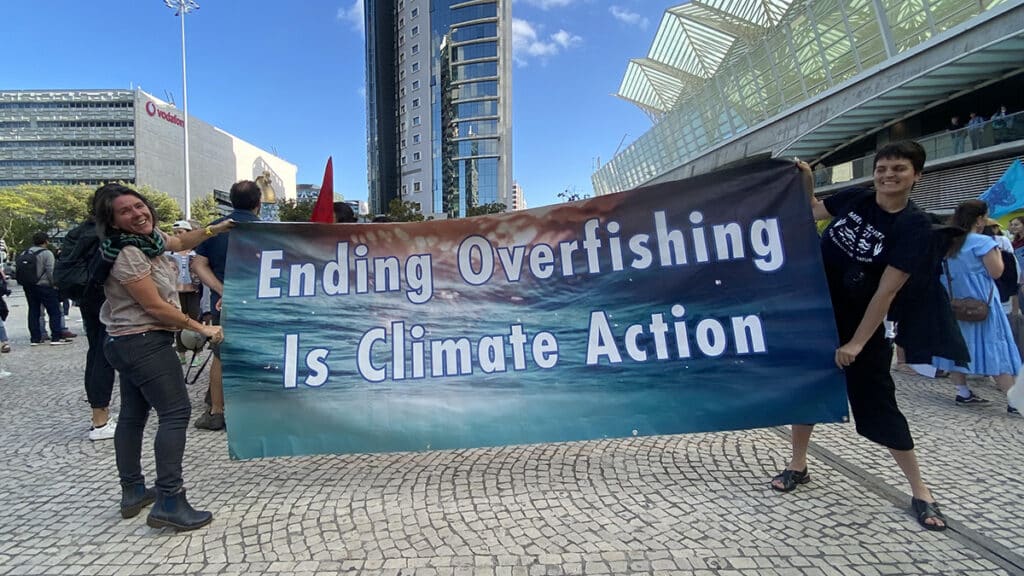
Photo: Dave Walsh/Our Fish
Midway through the UN Ocean Conference, Our Fish joined dozens of other organisations and 500 people for the Blue Climate March, which highlighted the “intrinsic link between the conservation of marine ecosystems and the fight against the climate crisis”.
After more than three years of COVID restrictions, it was fantastic to see hundreds of people marching together, and inspiring each other – it’s only through collaboration, pushing hard and demanding action from our leaders that we will get the protection our ocean needs.
While the UN Ocean Conference saw some positive commitments, our governments are yet to take this action. Since the conference closed, the impacts of the climate crisis are being felt beyond Lisbon – in Portugal and across Europe, and the world, through heatwaves, droughts and wildfires. Every action that can be taken to mitigate this crisis must be taken and it must be taken now.

